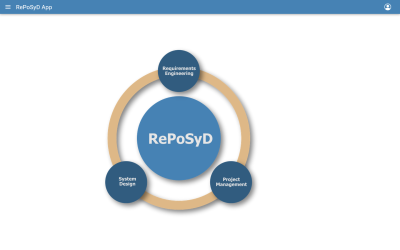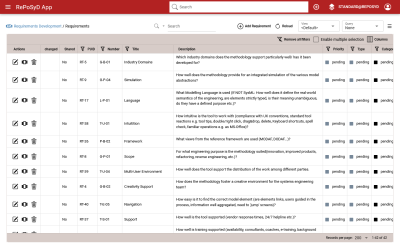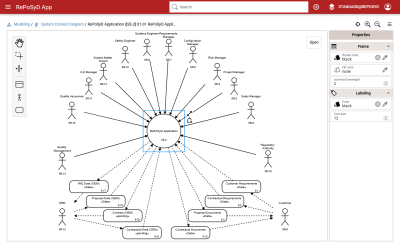Welcome to RePoSyD's wiki pages
RePoSyD in brief
RePoSyD is a process model and tool supporting systems engineering based development processes and covers the entire life cycle of a system, from idea to disposal. Please read “Yet Another Process Model” and “Why using a Reference Model?” to get a deeper understanding of the process model behind RePoSyD. Both, the process model and tool are scalable and can be adapted to the requirements of the project and organization.
RePoSyD has open interfaces and follows the principle of “Single Source of Truth”, i.e. the dataset in RePoSyD is universally valid, correct and reliable regardless of which source system it originates from. This includes both the Design Data stored in RePoSyD and the documents generated from them. They are also part of the information model and can be generated in different formats with the report generator.
The front end is web-based and runs as a “Single Page Application” (SPA) on all modern web browsers and s open for extensions and can be connected to other IT systems using RESTful web services.
RePoSyD is open source and available free of license fees and does not use proprietary formats for storing information.
- System Context Definition and Stakeholder Analyses
- Definition of capabilities and derivation of relevant requirements
- Managing requirements (priorities, maturity levels, categories)
- Acquisition of requirements from customer documents with source references
- Capture of normative documents and the requirements contained therein
- Requirements Traceability
- Definition of the test matrix for the requirements including the description of the acceptance criterion, the test steps, the necessary prerequisites for implementation and the relevant safety measures
- Generation of system and test specifications
- Work Breakdown Structure with corresponding work packages, tasks and deliverables.
- Traceability between work packages and relevant for project management requirements.
- Allocation of resources to the work packages and tasks for capacity planning.
- Decision management
- Action tracking
- Recording and tracking of actions with assignment to the information in RePoSyD
- Management of meeting minutes, including dispatch by e-mail.
- Definition of the System Architecture
- Functional Breakdown
- System Breakdown
- Physical Breakdown
- Graphical Modeling
- FFBD,
- System Context Diagram,
- Interface Management
- System States
- Hazard Log
- Versioning of all information and links
- Configuration management
- Variant management, i.e. any number of solution spaces can be defined in a project. An information element, e.g. a requirement, can then be contained in different solution spaces without having to copy the information.
- Report engine for generating documents in different formats, e.g. PDF, HTML.
- Access control via roles and groups
- Templates for projects and information
- Meta Model Management


